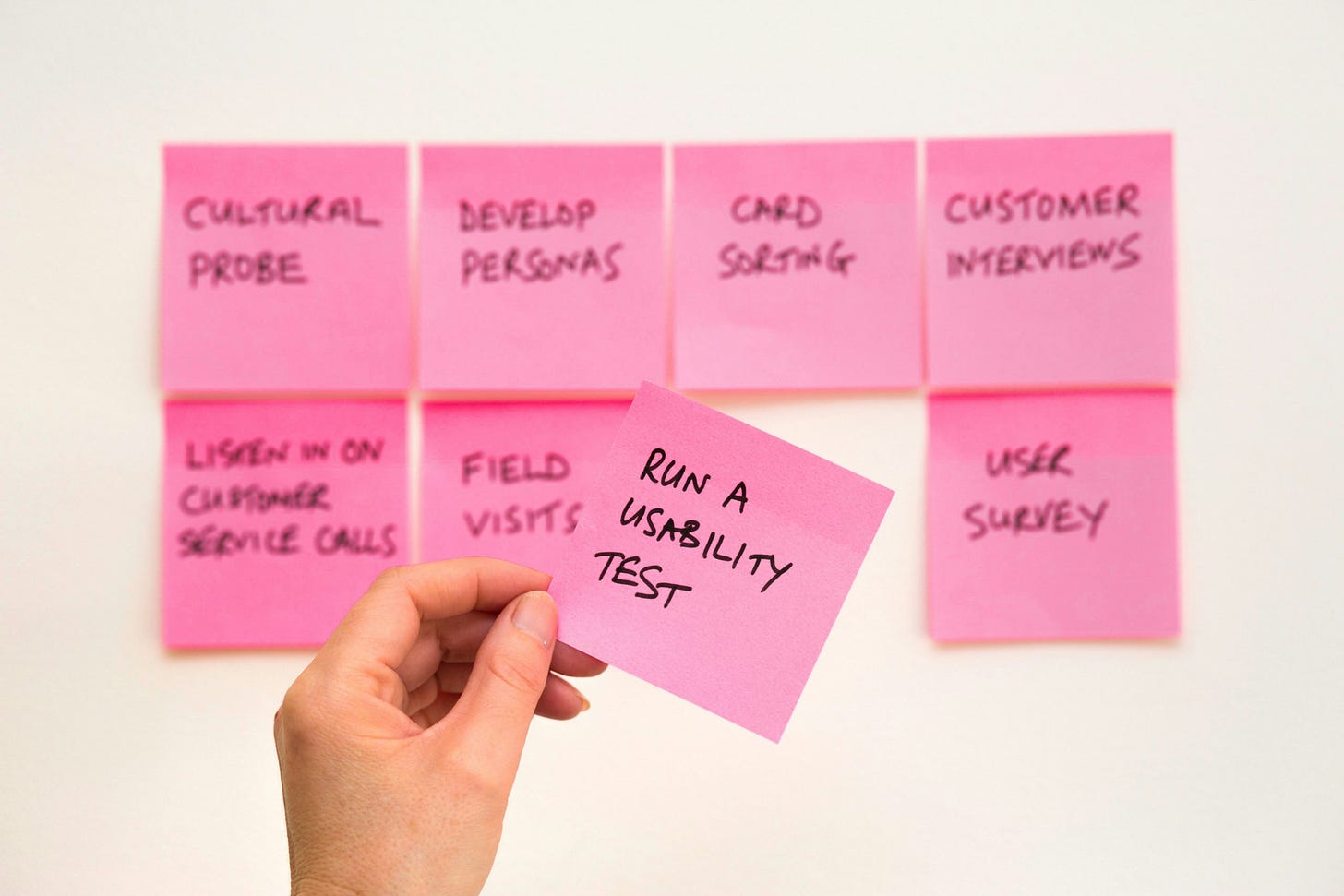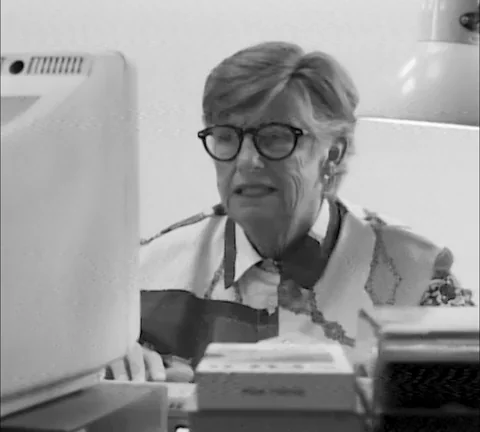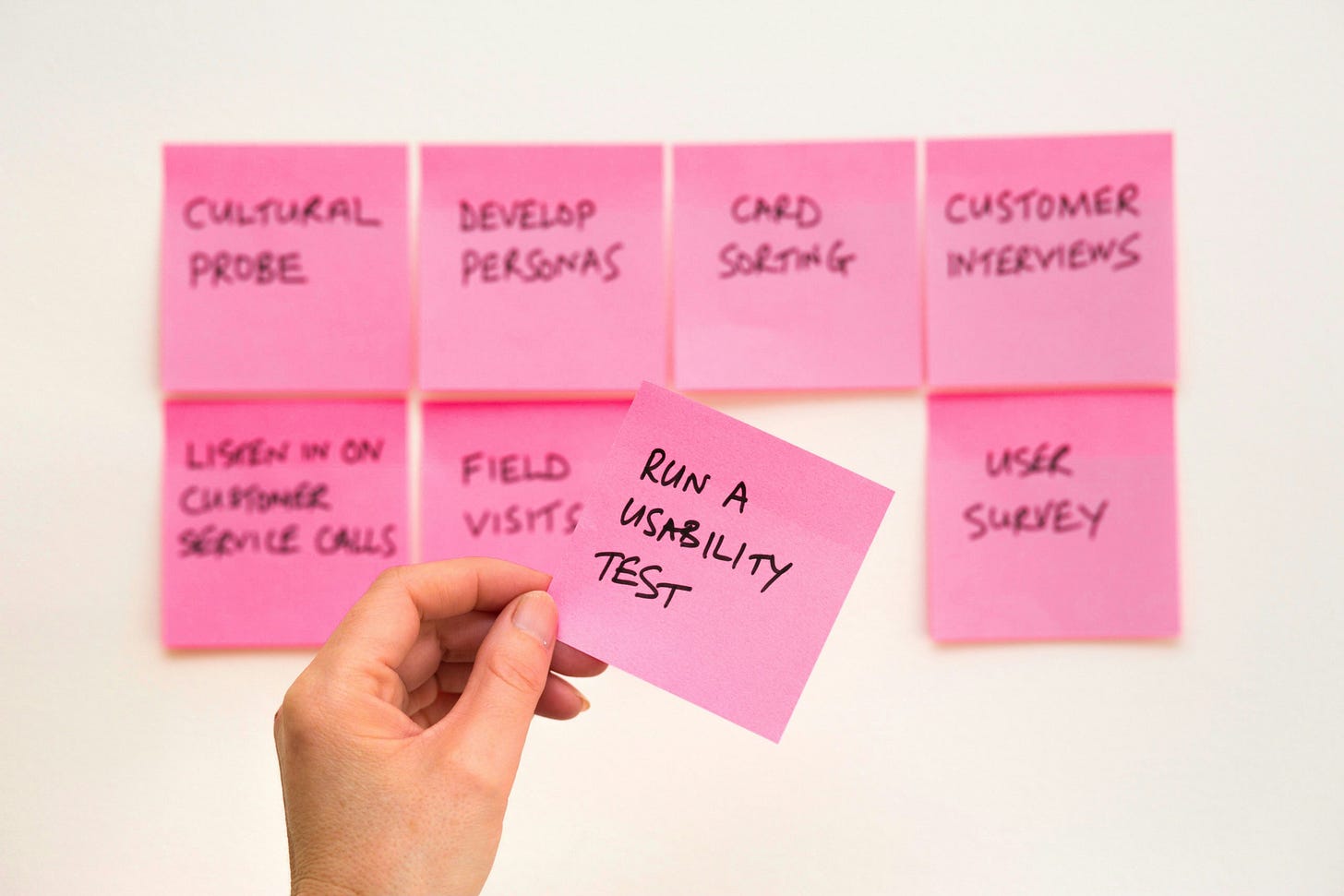Crafting User-Centered Documentation: Lessons from Usability Studies
How usability evaluation methods inform technical writers, enhance software documentation, and help meet user needs
[TLDR] A recent study, "Listen to Your Users: The Effect of Usability Evaluation on Software Development Practice," by Marta Kristín Lárusdóttir, an Associate Professor at Reykjavik University, provides insights of value to tech writers into the impacts of usability evaluation methods on software development.
Software has slithered into every corner of our lives, quietly elbowing its way into our shopping carts, Netflix queues, and even the spreadsheets where Karen from accounting secretly plots world 🌍 domination.
It’s the invisible concierge of modern existence, fetching cat memes while scheduling your root canal. Try to avoid it, and you’ll find yourself in a standoff with a self-checkout machine that seems to know your darkest secrets but still insists you didn’t bag the kale.
Widespread reliance on software apps makes usability critical. Tech writers are essential in creating clear, user-friendly documentation that reduces frustration and enhances usability satisfaction with software products.
What Is Usability?
"The extent to which a product can be used by specified users to achieve specified goals with effectiveness, efficiency, and satisfaction in a specified context of use."
Source: International Organization for Standardization (ISO) 9241-11, Ergonomics of human-system interaction—Part 11, Guidance on usability

Why Evaluating Usability Matters
Usability evaluation is like watching someone try to fold a fitted bed sheet—it reveals how well (or catastrophically) people interact with a system.
When system design leaves users bewildered, tech writers are saddled with the fallout, scrambling to cover up the cracks with explanations that shouldn't have been necessary to create in the first place.
Software Usability Lessons Learned
Usability Testing Gold Standard: The Think-Aloud Method
The Think-Aloud method is the gold standard for usability testing. It’s like eavesdropping on someone's inner dialogue while they navigate your software—only they know you're listening, and they're kind enough to talk out loud so you can hear their thoughts.
This technique helps evaluate usability by having users discuss their thoughts, decisions, and frustrations as they interact with a product or system. Their real-time narration shows you what they find easy, confusing, or difficult to use. Watching actual users struggle, triumph, or groan through real-world tasks uncovers challenges you might not otherwise notice.
Why Heuristic Evaluations Alone Are Insufficient
While helpful, heuristic evaluations can't compete with the raw, unfiltered honesty of a real-world user saying, "Wait, WTF am I supposed to click?"

Heuristic evaluations and the Think-Aloud method are like two very different dinner guests at a usability testing party.
The heuristics expert arrives early, armed with a checklist and a knowing smirk, pointing out all the theoretical flaws in the seating chart before anyone arrives. Meanwhile, the Think-Aloud participant strolls in fashionably late, sits down, and narrates their dinner experience in real time—“Why is the soup cold?” or “I can’t figure out which fork to use.”

Diverse Evaluation Methods Yield Richer Usability Insights
Mixing usability evaluation methods is like combining ingredients in a recipe—you get more flavor and texture.
Heuristic evaluations are fast, efficient, and perfect for catching broad issues early on. The Think-Aloud method, on the other hand, takes more effort but reveals what goes wrong when the guests (or users) interact with the product. Together, they make a well-rounded pair, offering the expert’s foresight and the user’s experience to create a more usable product.
Heuristic evaluations establish the structure, while incorporating real-world observations provide you the messy, juicy details. Together, they tell the full story of how users actually engage with a system.
For tech writers, this means you can predict the wild variety of ways people will tackle a task and create docs that speak to everyone, from the fearless power-user blazing through menus to the newbie poking buttons as if they might explode.
Tech Writers Should Prioritize Updates To Documentation That Align With High-Impact Usability Fixes
Tech writers should consider making updates to their documentation that align with high-impact usability fixes. Think of it as triaging a dinner party gone wrong—you deal with the kitchen fire before worrying about the slightly overcooked green beans.
This means playing the alignment game—focusing on updates that tackle the usability quirks most likely to trip users up. The goal? Craft content that explains and hands users the tools to succeed, even when the system isn’t optimized to work as easily as it might otherwise.
This gap between “it works” and “it works for humans” is where usability experts, designers, and yes, technical writers, swoop in to save the day. But until usability as a priority gets a permanent seat at the development table, the effort to make software truly user-friendly will remain the odd one out, quietly waiting for its turn to shine.
High-impact fixes address the parts of a system where users are most likely to stumble, curse, and possibly throw their smart phone across the room. Updating the documentation to match these fixes saves users from unnecessary agony and makes you look like the hero who actually understands their plight.
Plus, it’s a smart way for you to work. Why should you spend hours perfecting instructions for obscure features no one uses when you could tackle the big stuff everyone complains about? It’s like choosing to patch the roof instead of rearranging the furniture while rain pours in.
And let’s be honest: when you align your updates with what developers are fixing, you’re not just helping users—you’re making the whole team look good. Who doesn’t love a little mutual back-patting?

Why Don’t Software Devs Focus On Usability, Anyway?
The study didn't just lift the curtain on software developers and usability—it exposed a truth we all know, but don't love to admit:
Developers, no matter how much they appreciate usability data, are stuck in the land of tight deadlines and impossible to-do lists. They can't fix everything, so they cherry-pick the disasters that scream the loudest.
Software developers don’t focus on usability as much as you’d think because deadlines, feature requests, bug fixes, and management’s insistence on adding “just one more thing” tend to push usability into the corner like the kid no one wants on their dodgeball team.
It’s not that they don’t care; it’s just that “Does this button make sense?” tends to lose out when “Does the app crash?” is still on the table.
And, let’s not forget the classic “developer goggles” syndrome. Developers know how the system works because they built it, so they assume users will magically understand it, too. Add a sprinkle of budget constraints and a dash of “ship it now, fix it later,” and you’ve got a recipe for a product that sometimes feels like it actively dislikes its users.
Tech Writers: Don’t Let Usability Take The Back Seat
As much as you’d like to think perfect software falls from the sky, it’s a team sport, and technical writers are on the front lines. When usability takes a back seat, you’re explaining away the quirks, translating chaos into clarity, and ensuring users don’t toss their laptops out the nearest window. But imagine a world where usability isn’t an afterthought. Imagine if technical writers, developers, and designers worked together from the start to create systems that don’t just work—but work beautifully.
It’s not just a dream; it’s a goal worth striving for. In the end, making technology accessible and delightful isn’t just good for users—it’s good for all. So let’s stop patching over cracks and start building bridges.
Who’s in?

